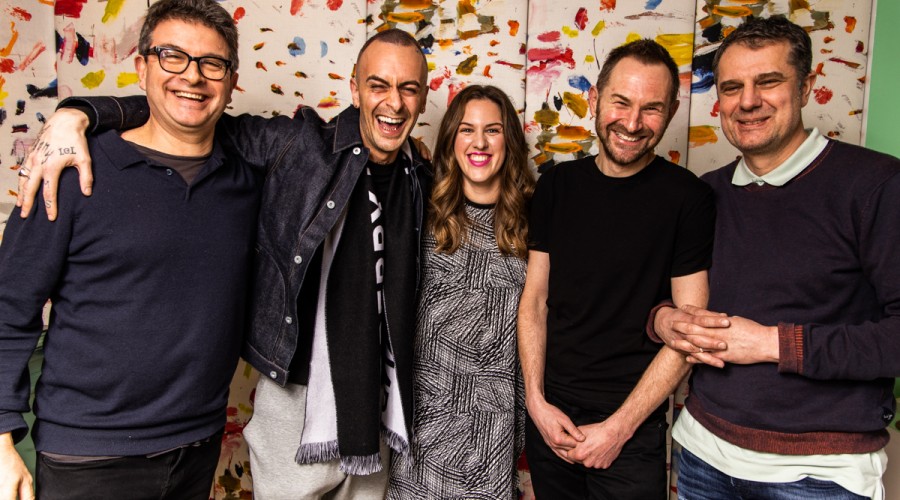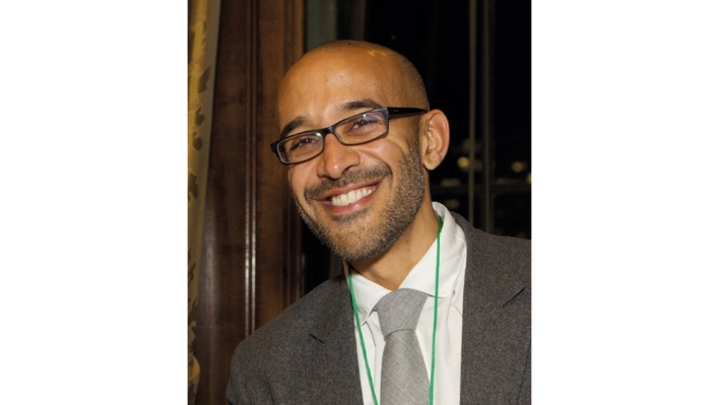Actor Joe Gilgun, who has bipolar disorder, reveals how his own life informs Brassic, the hit Sky One comedy he stars in
Brassic, Sky One’s tale of Lancashire lads on the scam, brought the channel critical acclaim and its highest ratings for a comedy show in almost a decade last year. The madcap comedy with a sensitive side, which The Guardian called “a hilarious, warm, brutal melange”, returns to our screens this month.
In advance of its second outing, a sold-out RTS early-evening event heard from writer Danny Brocklehurst, executive producer David Livingstone and actor Joe Gilgun, who brought his effervescent personality to the stage.
Brassic not only stars Gilgun, it is also based on stories from a difficult period in his life. But, as he was at pains to point out, it was never his intention to mine the misery of his experiences – the opposite, in fact: Brassic was intended to be a celebration of working-class life, warts and all.
“Any show that represents the working classes is fucking miserable. Some of the happiest people I know are working class; some of the smartest lads I know are working class,” he said.
“I was sick to death of us being depicted as long-suffering. Sure, there’s a bit of suffering that goes on and some of it is hand to mouth, but that’s not to say we’re all fucking miserable. That’s a middle-class view of what it is to be working class.”
Brassic, defined as broke, penniless, without means, boracic lint, skint, on the bones of yer arse, was created by Gilgun and Danny Brocklehurst, who wrote all but one episode of the first series. The latter, a journalist at the Manchester Evening News before he turned to screenwriting, has written RTS award-winning dramas such as Clocking Off, Shameless and Come Home.

“I’ve had a colourful past,” admitted Gilgun. He was a child actor on Coronation Street for a few years in the mid-1990s but, when his role was written out of the soap, he “went off the bloody rails and got up to all kind of shit for many years”.
It is the actor’s experiences from this period of his life that run through Brassic. Gilgun returned to acting a decade later, building a career that took him from Emmerdale, to Shane Meadows’ three This is England films, to E4 sci-fi comedy-drama Misfits and BBC Films’ Pride, which tells the story of the gay and lesbian activists who supported the 1984-85 miners’ strike.
On the set of the award-winning movie he met the actor Dominic West, who plays Vinnie’s narcissistic doctor in Brassic. West encouraged the film’s executive producer, Livingstone, to listen to Gilgun’s “crazy stories”. Despite being hindered by serious dyslexia, Gilgun wrote them down “on acres of wallpaper”, recalled Livingstone.
Gilgun recalled Livingstone’s reaction when the exec read them: “These are the ramblings of a fucking lunatic.” The actor agreed: “They were the ramblings of a lunatic – we needed this bugger here [Brocklehurst] to [make sense of them].”
“Even though I was a fan of Joe from Misfits, a little bit of me thought, ‘Oh God, an actor with ideas’,” recalled Brocklehurst. “But we got on and I could see really clearly that the stories and ideas Joe had for the show were brilliant and funny. They were in a tone that I’d written in a long time ago [on Channel 4’s Shameless] and I wanted to do again. I could see there was a show here that excited me, and I felt we could collaborate really well.”
"It doesn’t matter that you’ve got a nice flat. I don’t finish a day at work and go home, and everything goes away. I am bipolar – that’s me"
Sky One agreed and commissioned Livingstone’s company, Calamity Films (whose credits include Pride, Judy and Last Christmas) to make the show, the indie’s first TV series.
Brocklehurst and Gilgun sent ideas back and forth via long WhatsApp messages – “podcasts, basically”, said the writer, who added structure and writer’s polish to the actor’s stories.
“There was so much good stuff from Joe’s life and great, funny ideas, but what you’ve got to do is shape it,” said Brocklehurst. “We had to take that great source material and turn it into a series.
“It was such a strong starting point… but then, like with any series, you talk so much, come up with new ideas and embellish things, so it becomes its own new thing as you go down the road.”
Throughout his life, Gilgun’s dyslexia has made reading and writing difficult. “What I have got is bloody good ideas. I was made to feel bloody stupid and, for years, I believed that. Only in the last five or six years have I started to realise that I’m not,” he said.
These ideas, he added, are like a “big, tangled ball of wool; my head doesn’t work in a linear way at all. I have the ideas but I can’t put them together.”
Livingstone admitted to anxiety about whether Brassic’s mix of broad comedy and sensitivity would work on screen. “It isn’t something you see every day,” he said. But, the executive producer added: “It really held together – if it can make you cry and roar with laughter, then that’s a good spot to be in.”
“The tears, the sadness,” reckoned Gilgun, “ground the madness of the show. We didn’t want to make it too heavy, but a lot of the positive feedback came off the back of the poignant moments.”
Gilgun’s character, Vinnie, like the actor, has bipolar disorder. “Joe has been very public about his own bipolar, but we were worried at first about dealing with that in a comic environment,” said Brocklehurst.
"It’s difficult to put into words; it’s been a life-changing thing"
However, after some thought, the writer decided, “as long as we’re truthful about it, we can be as funny as we like”.
“I have serious mental health problems,” said Gilgun. “I have these fucking meltdowns, like the shit you see on the [programme]. I get very frustrated and angry. When I go on a down… I’m pissed off; I can’t control how I feel. It doesn’t matter that you’ve got a nice flat. I don’t finish a day at work and go home, and everything goes away. I am bipolar – that’s me.
“The medicine Vinnie is on, I’m on. The shit Vinnie does, that’s the man I would have become if it wasn’t for acting. [Brassic] is very, very personal to me. I knew my idea was a good one. I believed it would go on TV. I have other ideas – they will happen, absolutely they will. I believe in myself. For the first time in a lifetime, I know my own worth – I’m not dumb and I want more.”
For Gilgun, “the whole process has been honestly life-changing”. It took five years – from the actor telling stories to Dominic West on the set of Pride and scribbling down his ideas on wallpaper – for Brassic to reach the screen.
“It was exciting while it was happening but it went past in a blur and, before you know it, it’s on the fucking TV and it’s massive,” said Gilgun. “It’s difficult to put into words; it’s been a life-changing thing.”
Report by Matthew Bell. The RTS early-evening event was held at H Club London on 30 January and chaired by television journalist and broadcaster Emma Bullimore. It was produced by the RTS, Sky and Premier Communications.







